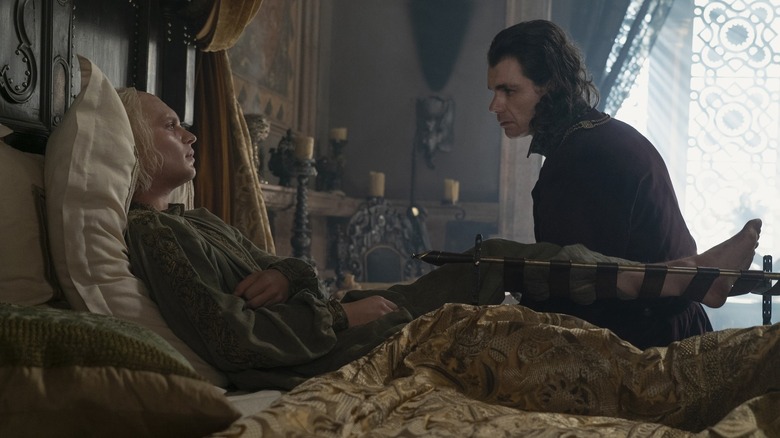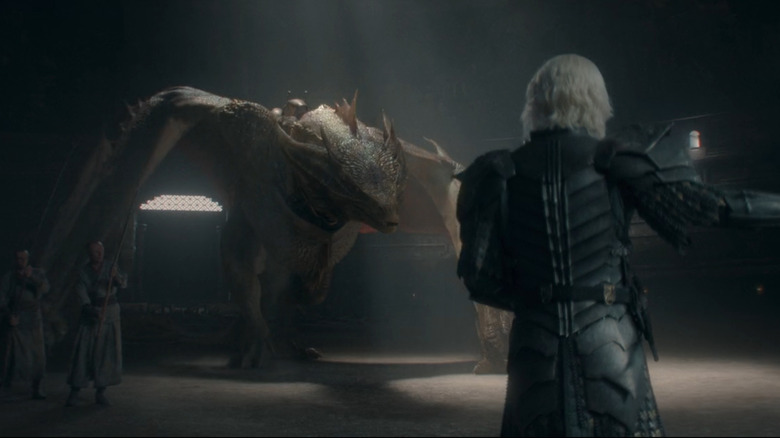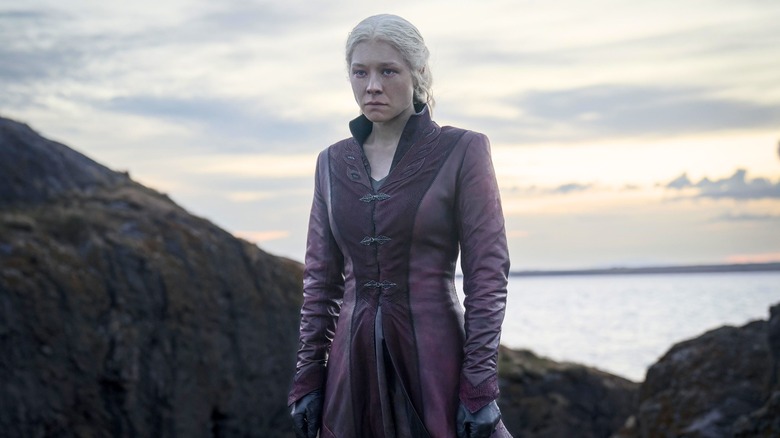The House Of The Dragon Season 2 Finale's Most Tragic Moment Is A Lie
A lot happens in the season 2 finale of "House of the Dragon," so it's easy to overlook a throwaway line in an early scene with Aegon II (Tom Glynn-Carney) and Larys Strong (Matthew Needham). In between talking about their plans to abandon King's Landing, Aegon mentions that his dragon Sunfyre is dead, presumably succumbing to its wounds shortly after the Battle of Rook's Rest.
For show-only viewers, this line is significant in how it emphasizes Aegon's newfound disconnect from his Targaryen roots. A big part of a Targaryen's claim to the throne is their ability to ride a dragon into battle, and Aegon can no longer do that. Sunfyre's demise is a symbolic death, similar to what happened with Sansa's direwolf Lady in "Game of Thrones." The direwolves were basically the Starks' equivalent of dragons, so when Sansa lost hers it served as an ill omen for what her time in King's Landing would bring. Aegon is going through a similar crisis in identity as Sansa's, this time with more gruesome results.
But for fans of the book, "Fire & Blood," this line is significant in that it seems like a major departure from the source material. Either Aegon hasn't been told the truth about Sunfyre's condition, or the show's embarking on yet another risky adaptive flourish.
Spoilers below for "Fire & Blood," and likely the rest of "House of the Dragon."
Sunfyre in the book: still alive!
The good news is that the many dragons in the book don't die out quite so quickly. After the battle at Rook's Rest, Sunfyre lives to roar another day, allowing Aegon to have at least one friend who will support him unconditionally. The bad news is that Sunfyre is also heavily wounded by the battle, with one whole wing torn from his body. As the book describes it:
"The king's dragon, Sunfyre, too huge and heavy to be moved, and unable to fly with his injured wing, remained in the fields beyond Rook's Rest, crawling through the ashes like some great golden wyrm. In the early days he fed himself upon the burned carcasses of the slain. When those were gone, the men Ser Criston had left behind to guard him brought him calves and sheep."
Things seem to be a little different in the show, which establishes (through Rhaenys' dragon Meleys) that dragons are in fact light enough to be taken back to King's Landing. Meleys' body is paraded through the city's streets, which raises the question of what exactly the show characters did with Sunfyre. Did they bring him back too, but more privately? Or did they decide to leave him by Rook's Rest as well?
This is all important because, although Aegon will never be able to ride again, his dragon will likely play a major role in season 3 or 4. Near the end of the war, Book Rhaenyra arrives at Dragonstone to discover a trap's been laid before her: the presumed-dead King Aegon is waiting there with his still-crippled Sunfyre. He has Sunfyre burn and eat Rhaenyra, as her ten-year-old son watches helplessly. It's a bleak moment, but it's also a crucial one in the narrative.
Maybe Sunfyre's 'death' isn't a lie at all
Rhaenyra's death isn't just important because it signals the end of the war, but because of the loaded symbolism of her being killed by her house's own sigil. When it comes to making the thematic point about how Targaryen power is a double-edged sword, there's no better metaphor the show could use.
But given the finale's other game-changing events, like the secret newfound alliance between Rhaenyra and Alicent, perhaps "House of the Dragon" really has killed Sunfyre off. Maybe the writers have other plans for how they'll go about killing Rhaenyra, or maybe they won't kill Rhaenyra at all. Yes, that might contradict the book significantly, and it would also undermine a line from "Game of Thrones" where Joffrey laughs about Rhaenyra's death. But maybe "House of the Dragon" isn't interested in being a straightforward prequel to the original series. Maybe this show exists in an alternative timeline. Maybe it's going for its own separate thing, books and previous show be damned.
Given how depressing the road ahead is for book Rhaenyra, and how much it frustratingly mirrors the downslide of Daenerys in season 8, a total shake-up from the source material might not be so bad. After all, it sure would be nice if a female Targaryen got to enjoy the crown for once.


